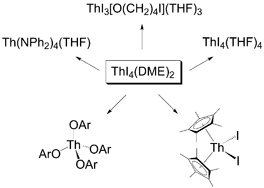Anhydrous metal halides and their soluble Lewis base-adduct relatives are ubiquitous starting materials in inorganic and organometallic chemistry, serving as extremely versatile precursors to myriad derivatives. As a result, reliable and straight-forward protocols for accessing such species allow researchers to deploy their carefully crafted ligands and explore unexpected reactivity, as well as fully unveil the richness of previously reported systems.
Indeed, only a handful of thorium(IV) halide starting materials are commonly utilized, and as thorium turnings are becoming increasingly hard to come by, new routes to anhydrous thorium(IV) halides from available thorium(IV) salts are crucial. Jaqueline Kiplinger and co-workers have recently reported a facile synthesis of ThI4(dme)2 and have demonstrated its keen ability to be derivatized. As molecular actinide iodide complexes have been shown to offer markedly differing reactivities from their chloride counterparts, this contribution may allow for yet unseen reactivity at Th(IV) centres, and maybe even provide less tumultuous access to the exceptionally rare Th(III) oxidation state.
Check out the full article to read more about this new precursor and related complexes:
Thorium-mediated ring-opening of tetrahydrofuran and the development of a new thorium starting material: preparation and chemistry of ThI4(DME)2
Nicholas Travia, Marisa Monreal, Brian Scott and Jaqueline Kiplinger,
Dalton Transactions, 2012











